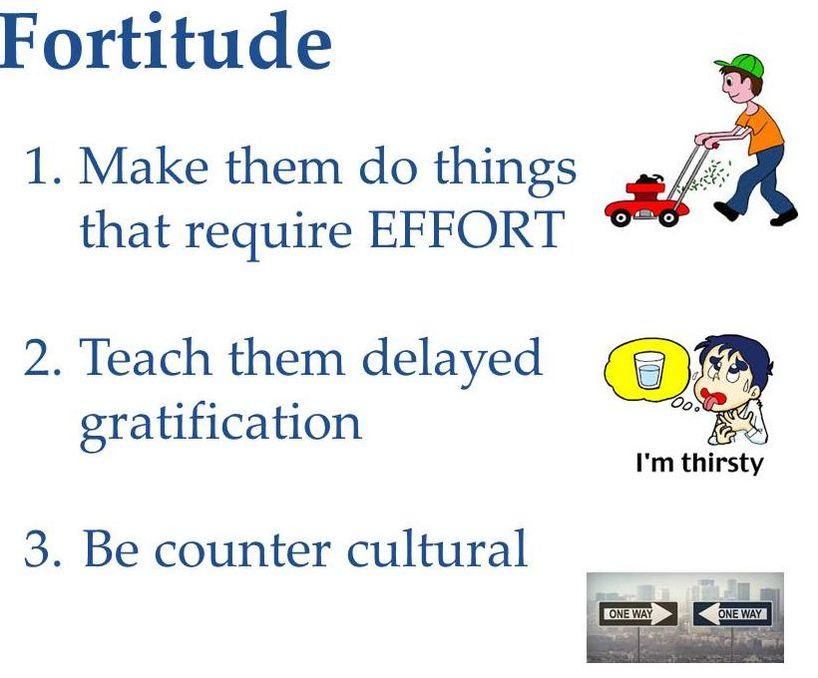How to foster certain virtues.2. FortitudeFortitude or -Resilience is a more trendy word, although it only emphasizes one aspect of fortitude. As I said when I started strengthening the character and forging a strong will has to be one of our primary objectives in the education of our children. Think of how this country was made, the pioneers, the immigrants, they had to face a lot of hardships, work in bad conditions, cold weather, they were tough, they were strong and so were their children. Nowadays, we live in a society with a lot of material comfort, that puts physical and emotional safety as number 1 priority and we are educating “softy and wimpy kids” that are lazy, selfish and want to be entertained all the time. The tendency is to not require any effort from our children and over-protect them from small failures. But we know life is hard, unfair and they are going to face difficulties, obstacles, setbacks... So we need to prepare them for life. 2. FortitudeSo how can you educate fortitude? 1. We have to make them do things that require effort. The dictionary defines effort as a vigorous or determined attempt to achieve something overcoming difficulties. So: don’t pack your child’s backpack, don’t carry her backpack, don’t bring to school his forgotten lunch box/agenda, and don’t peel a banana for a 5-year-old child. Teach them the skills rather than do things for them. I said that to acquire a habit we have to repeat good acts: so what I said earlier of the bedtime routine, also have a study routine, fighting distractions, their wanting to get up and play. Chores require effort. Have them do chores. Pick tasks that are simple and age-appropriate, instill a routine. Sticking to a routine can help turn tasks into a habit instead of a chore. Stay away from nagging Instead of nagging, try a gentle reminder that will encourage them to fulfill their responsibilities. Cut them some slack once in a while may be acceptable. Avoid turning chores into a punishment for doing something wrong, as this will allow them to associate chores to a bad consequence. Other things that require effort and build fortitude: make them mow the lawn or trim the ivy and the bushes, work in the yard in the heat of the summer, power wash your outdoor furniture, wash the car, the house windows... I once ask my son who was maybe 7 to cut the leaves of the sago palm tree that were coming in the wrong direction, and he cut them all and left a beautiful trunk!!!! You do run some risks when asking your kids things that require effort! Also, go on hikes and bike rides, push their limits, don’t turn around at their first “I’m tired” Hike to Notch Mountain in Colorado by 12-15 year olds: 13,110 ft. 2. Teach them delayed gratification. Make them put up with thirst, hunger, heat, cold, etc. Don't put them a movie in the car ride to the grocery store or have always a snack handy in case they get hungry! These things start when they are little and when they are older you explain to them the WHY as I said in an earlier post. We don't have to give in to every whim. Offer kids what they NEED, not just what they WANT. Don’t be afraid to say “No!” to your kids if what they want is not what they need. A few years ago, one of my children dared to complain about the snack they were having and I told them that in Haiti the kids ate mud cookies, if they wanted some they could make them. If you don’t believe me google it and it will show up! 3. Be counter cultural: in the things they do, in the way they dress, in the movies they watch, in the programs they do, etc. Here it is easier than in other countries to go against the current because there is more diversity of people, of cultures, of religions and in a way there is more tolerance. So let's do it! Being a little "different" or "weird", will make the strong. Our daughter goes to a public school and I was having a coffee with her across the street from her school and I saw all these girls that were dressed the same (and the school has no uniform!): a t-shirt and yoga pants! She doesn't dress like that (she wears jeans or other pants with a shirt, a sweater) so I pointed that out to her and asked her: "what do you feel that everyone dresses differently?" and she said: "mom, I really don't care!" And that was the end of it. Period. Go against the trophy culture: Everyone gets a trophy. A Boston College psychology professor Peter Gray said: "We have raised a generation of young people who have not been given the opportunity to…experience failure and realize they can survive it" . Our son was maybe in 2nd grade and was enrolled in a soccer league. They lost every single game and we an email from a mom saying that she was going to buy trophies for all of them. I emailed back saying, please don't buy a trophy for my son, they have lost all the games, they don't deserve a trophy. The lady just couldn't understand and insisted that I get one. After a few email exchanges, my answer was still now. I told my son that he was not going to receive the trophy at the party and I explained him why and he understood. Well, the mom, hadn't understand and still bought him a trophy which my son declined! The real secret to happiness isn't more high fives; it's developing fortitude. In our mania for physical safety, coupled with "emotional safety," we have systematically deprived our children of the thousands of challenging—and sometimes upsetting—experiences that they need in order to learn Fortitude. Making your children strong will help them to not fall into peer pressure in middle school, high school and college, they will know how to behave. In other words, they will behave well because they want to! Related to fortitude, is the virtue of temperance, which, like any other virtue, is fundamentally affirmative. It permits a person to become a master of oneself and puts order into one’s emotions and affections, likes and desires. Sometimes we put more emphasis in the control from without –from us- but it is important that our children achieve self mastery. For example, that they don't use their phone at night because they don't want to use them not because we take them away. But your son or daughter may not be there yet. If you haven’t educated them in Fortitude, they made need their phone to charge in your room at night. The contents of this lecture were taken from different sources:
Educar la Voluntad by Fernando Corominas Several lectures given by David Isaacs Hijos Felices. La educación de las Virtudes by Diego Ibañez Langlois Victoria Prooday's blog
0 Comments
Leave a Reply. |
AuthorPilar Caranti holds a Masters in Psychology from the Catholic University of Argentina. She is a Certified Professional Life Coach. Family topics and the education of children are her passion. She has given many lectures on parenting topics like: forming the will of our children, authority, education of leisure, pornography, etc. Archives
June 2019
|





